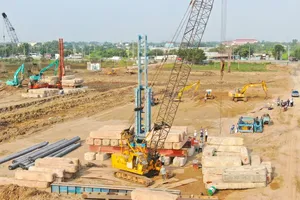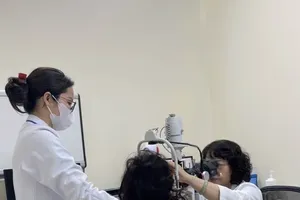
Some patients even wait in line for 4-5 hours while others must share beds with 2-3 other patients as hospitals are facing a crisis-level shortage of beds. Worse, patients endure 1-2 months of waiting for surgery.
Patient crowds were seen in the waiting areas at various departments such as respiratory, musculoskeletal, endocrine, neurology, and gastroenterology-renal at the People’s Hospital 115. The X-ray, ultrasound, and endoscopy sections faced similar conditions. Many patients held their tickets, following the electronic display boards, feeling frustrated as they waited for their turn.
Patient overcrowding and overwhelming also took place at Cho Ray Hospital where chairs in front of waiting areas were all occupied early in the morning.
Many patients from all corners of the country come to Ho Chi Minh City for medical consultations and treatment at the Eye Hospital. However, they often had to return home after the hospital announced that they needed to wait until next month to schedule an appointment. Similarly, some patients referred for radiation therapy at the Tumor Hospital in Ho Chi Minh City face a similar situation due to the insufficient capacity of the radiation machines.
According to statistics from the Ho Chi Minh City Department of Health, the city currently has 129 hospitals including 12 central hospitals, 32 city hospitals, 19 district hospitals, and 66 private hospitals. Among these, 22 hospitals are designated as the top-tier facilities for specialized technical expertise and advanced healthcare development in the southern region.
Additionally, 45 hospitals are recognized as continuous training centers. Consequently, the city consistently receives a large number of patients from southern provinces and cities seeking medical care.
Specifically, in the first six months of this year, hospitals in the city received 10,676,210 patients for consultations and treatment, representing an 11.4 percent increase compared to the same period in 2023, with total health insurance payments exceeding VND14,000 billion(US$549,934,295).
According to healthcare experts, several reasons are contributing to the overload at hospitals. These include the increasing demand for medical care from citizens, while the number of hospital beds has not kept pace.
Additionally, local health stations are facing a shortage of healthcare personnel and inadequate quality of care at lower-level facilities has eroded patient trust.
Furthermore, the health insurance policy’s drug classification based on hospital tiers has its shortcomings. Patients with the same condition may receive different-quality medications when treated at hospitals of varying levels. Consequently, many patients take it upon themselves to transfer to higher-tier hospitals in hopes of receiving better-quality drugs and being examined by highly skilled medical teams.
Director Tang Chi Thuong of the Ho Chi Minh City Department of Health acknowledged the increasing influx of patients from provinces and cities seeking medical checkups in the city. To address this issue, the city’s healthcare system is implementing various strategies to alleviate the burden on peripheral hospitals. These measures include enhanced collaboration with provincial health departments in patient management and improving treatment capabilities at grassroots facilities.
The city has also established partnerships with health departments in the Central Highlands region, the Southeast region, and the Mekong Delta region with key activities including medical technique transfer between general and specialized hospitals within Ho Chi Minh City and provincial hospitals. Additionally, a network of specialized departments has been developed, prioritizing specialties such as obstetrics, pediatrics, neurology, trauma, stroke, cardiovascular diseases, and oncology
In addition, disease control agencies in localities have also signed memoranda of understanding to enhance cooperation and improve epidemic prevention effectiveness. Local healthcare departments prioritize collaborative efforts to establish a connected application platform and streamline data management for medical practices.
Currently, the regional health project is being developed by the Ho Chi Minh City Department of Health for submission to the municipal People’s Committee. The project aims to provide healthcare services for residents in the area. Under the program, every six months, localities will review and evaluate their experiences to transform cooperative plans into practical activities to reduce the burden on peripheral hospitals in the city and enhance the quality of healthcare for residents in the region, as affirmed by Associate Professor Tang Chi Thuong.
























